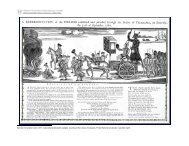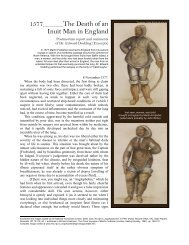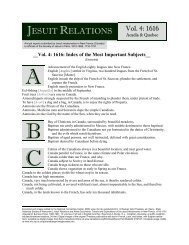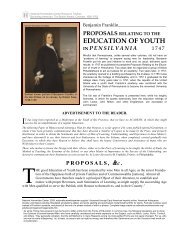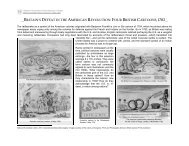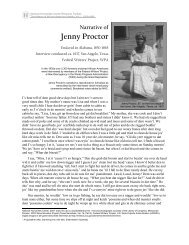Standard Oil: Tarbell, Rockefeller, U.S. Supreme Court - National ...
Standard Oil: Tarbell, Rockefeller, U.S. Supreme Court - National ...
Standard Oil: Tarbell, Rockefeller, U.S. Supreme Court - National ...
Create successful ePaper yourself
Turn your PDF publications into a flip-book with our unique Google optimized e-Paper software.
Ida M. <strong>Tarbell</strong><br />
Ida M. <strong>Tarbell</strong>, “The History of the<br />
<strong>Standard</strong> <strong>Oil</strong> Company,” McClure’s<br />
Magazine, 1902-1904<br />
*<br />
Mr. <strong>Rockefeller</strong> . . . secured an alliance with the<br />
railroads to drive out rivals. For fifteen years he<br />
received rebates of varying amounts on at least<br />
the greater part of his shipments, and for at least<br />
a portion of that time he collected drawbacks of<br />
the oil other people shipped; at the same time he<br />
worked with the railroads to prevent other<br />
people getting oil to manufacture, or if they got<br />
it he worked with the railroads to prevent the<br />
shipment of the product. If it reached a dealer,<br />
he did his utmost to bully or wheedle him to<br />
countermand his order. If he failed<br />
in that, he undersold until the<br />
dealer, losing on his purchase,<br />
was glad enough to buy thereafter<br />
of Mr. <strong>Rockefeller</strong>. . . .<br />
. . . There is no independent refiner or jobber<br />
who tries to ship oil freight that does not meet<br />
incessant discouragement and discrimination. . .<br />
“If I get a barrel of oil out of Buffalo,” an<br />
independent dealer told the writer not long ago,<br />
“I have to sneak it out. There are no public<br />
docks; the railroads control most of them, and<br />
they won’t let me out if they can help it. If I<br />
want to ship a car-load they won’t take it if they<br />
can help it. They are all afraid of offending the<br />
<strong>Standard</strong> <strong>Oil</strong> Company.” . . .<br />
On The<br />
<strong>Standard</strong> <strong>Oil</strong><br />
Company<br />
__Ida M. <strong>Tarbell</strong>, 1902-1904<br />
__John D. <strong>Rockefeller</strong>, 1909<br />
__U.S. <strong>Supreme</strong> <strong>Court</strong>, 1911<br />
John D. <strong>Rockefeller</strong><br />
John D. <strong>Rockefeller</strong>, Random<br />
Reminiscences of Men and Events,<br />
1909 (pub. 1933)<br />
Of all the subjects which seem to have attracted the<br />
attention of the public to the affairs of the <strong>Standard</strong><br />
<strong>Oil</strong> Company, the matter of rebates from railroads<br />
has perhaps been uppermost. The <strong>Standard</strong> <strong>Oil</strong><br />
Company of Ohio, of which I was president, did<br />
receive rebates from the railroads prior to 1880, but<br />
received no advantages for which it did not give full<br />
compensation. The reason for rebates was that such<br />
was the railroads’ method of business. A public rate<br />
was made and collected by the railroad companies,<br />
but, so far as my knowledge extends, was seldom<br />
retained in full; a portion of it was repaid to the<br />
shippers as a rebate. By this method the real rate of<br />
freight which any shipper paid was not known by his<br />
competitors nor by other railroad companies, the<br />
amount being a matter of bargain with the carrying<br />
company. Each shipper made the best bargain that<br />
he could, but whether he was doing better than his<br />
competitor was only a matter of conjecture. . . .<br />
. . . The <strong>Standard</strong> gave advantages to<br />
the railroads for the purpose of<br />
reducing the cost of transportation of<br />
freight. It offered freights in large<br />
quantity, car-loads and train-loads. It<br />
furnished loading facilities and<br />
discharging facilities at great cost. It provided regular<br />
traffic, so that a railroad could conduct its<br />
transportation to the best advantage and use its<br />
equipment to the full extent of its hauling capacity<br />
without waiting for the refiner’s convenience. It<br />
exempted railroads from liability for fire and carried<br />
its own insurance. It provided at its own expense<br />
* Excerpted, and images added, by the <strong>National</strong> Humanities Center, Research Triangle Park, NC. 2005. <strong>Rockefeller</strong> excerpts: permission<br />
pending from Random House (Doubleday Broadway Books Publishing Group).
[A] community of interests exists between<br />
railroads and the <strong>Standard</strong> <strong>Oil</strong> Company sufficiently<br />
strong for the latter to get any help it<br />
wants in making it hard for rivals to do business.<br />
The <strong>Standard</strong> owns stock in most of the great<br />
systems. It is represented on the board of<br />
directors of nearly all the great systems, and it<br />
has an immense freight not only in oil products,<br />
but in timber, iron, acids, and all of the necessities<br />
of its factories. It is allied with many other<br />
industries, iron, steel, and copper, and can swing<br />
freight away from a road which does not oblige<br />
it. It has great influence in the stock market and<br />
can depress or inflate a stock if it sets about it.<br />
Little wonder that the railroads, being what they<br />
are, are afraid to “disturb their relations with the<br />
<strong>Standard</strong> <strong>Oil</strong> Company[.]”<br />
IMTARBELL<br />
. . . Until the people of the United States<br />
have solved the question of free and equal<br />
transportation it is idle to suppose that they<br />
will not have a trust question. So long as it<br />
is possible for a company to own the<br />
exclusive carrier on which a great natural<br />
product depends for transportation, and to<br />
use this carrier to limit a<br />
competitor’s supply or to cut<br />
off that supply entirely if the<br />
rival is offensive, and always<br />
to make him pay a higher<br />
rate than it costs the owner, it is ignorance<br />
and folly to talk about constitutional<br />
terminal facilities which permitted economies in<br />
handling. For these services it obtained contracts<br />
for special allowances on freights. . . .<br />
To understand the situation which affected the<br />
giving and taking of rebates it must be remembered<br />
that the railroads were all eager to enlarge their<br />
freight traffic. They were competing with the facilities<br />
and rates offered by the boats on lake and canal and<br />
by the pipe-lines. All these means of transporting oil<br />
cut into the business of the railroads, and they were<br />
desperately anxious to successfully meet this<br />
competition. As I have stated we provided means for<br />
loading and unloading cars expeditiously, agreed to<br />
furnish a regular fixed number of carloads to<br />
transport each day, and arranged with them for all<br />
the other things that I have mentioned, the final<br />
result being to reduce the cost of transportation for<br />
both the railroads and ourselves. All this was<br />
following in the natural laws of trade.<br />
JDROCKEFELLER<br />
The day of individual competition in large affairs is past and gone ⎯ you<br />
might just as well argue that we should go back to hand labour and throw<br />
away our efficient machines ⎯ and the sober good sense of the people will<br />
accept this fact when they have studied and tried it out. Just see how the list<br />
of stockholders in the great corporations is increasing by leaps and bounds.<br />
This means that all these people are becoming partners in great businesses.<br />
Library of Congress<br />
<strong>Standard</strong> <strong>Oil</strong> Company, Richmond, California, 1913<br />
The story of the early history of the oil trade is too well<br />
known to bear repeating in detail. The cleansing of crude<br />
petroleum was a simple and easy process, and at first<br />
the profits were very large. Naturally, all sorts of people<br />
went into it: the butcher, the baker, and the candlestickmaker<br />
began to refine oil, and it was only a short time<br />
before more of the finished product was put on the<br />
market than could possibly be consumed. The price<br />
went down and down until the trade was threatened<br />
with ruin. It seemed absolutely necessary to extend the<br />
market for oil by exporting to foreign countries, which<br />
required a long and most difficult development; and also<br />
to greatly improve the processes of refining so that oil<br />
could be made and sold cheaply, yet with a profit, and to<br />
use as by-products all of the materials which in the lessefficient<br />
plants were lost or thrown away.<br />
2
amendments limiting trusts. . . So long as<br />
the <strong>Standard</strong> <strong>Oil</strong> Company can control<br />
transportation as it does to-day, it will<br />
remain master of the oil industry, and the<br />
people of the United States will pay for<br />
their indifference and folly. . . .<br />
. . . We are a commercial people. We<br />
cannot boast of our arts, our crafts, our<br />
cultivation; our boast is in the wealth we<br />
produce. As a consequence business<br />
success is sanctified, and, practically, any<br />
methods which achieve it are justified by<br />
a larger and larger class. . . .<br />
The claim that only by some such<br />
aggregation as Mr. <strong>Rockefeller</strong> formed<br />
could enough capital have been obtained to<br />
develop the business falls utterly in face of<br />
fact. Look at the enormous amounts of<br />
capital, a large amount of it speculative, to<br />
be sure, which the oil men claim went into<br />
their business in the first ten years. It was<br />
estimated that Philadelphia alone put over<br />
$168,000,000 into the development of the<br />
<strong>Oil</strong> Regions, and New York $134,000,000,<br />
in their first decade of the business. . . The<br />
oil business would no more have suffered<br />
for lack of capital without the <strong>Standard</strong><br />
combination than the iron or wheat or<br />
railroad or cotton business. The claim is<br />
idle, given the wealth and energy of the<br />
These were the problems which confronted us almost at<br />
the outset, and this great depression led to consultations<br />
with our neighbors and friends in the business in the effort<br />
to bring some order out of what was rapidly becoming a<br />
state of chaos. To accomplish all these tasks<br />
of enlarging the market and improving the<br />
methods of manufacture in a large way was<br />
beyond the power or ability of any concern<br />
as then constituted. It could only be done,<br />
we reasoned, by increasing our capital and<br />
availing ourselves of the best talent and experience.<br />
It was with this idea that we proceeded to buy the largest<br />
and best refining concerns and centralize the<br />
administration of them with a view to securing greater<br />
economy and efficiency. The business grew faster<br />
than we had anticipated.<br />
As for the ethical side, there is no cure but in an increasing scorn of unfair<br />
play ⎯ an increasing sense that a thing won by breaking the rules of the<br />
game is not worth the winning. When the business man who fights to<br />
secure special privileges, to crowd his competitor off the track by other<br />
than fair competitive methods, receives the same summary disdainful<br />
ostracism by his fellows that the doctor or lawyer who is “unprofessional,”<br />
the athlete who abuses the rules, receives, we shall have gone a long way<br />
toward making commerce a fit pursuit for our young men.<br />
<strong>Standard</strong> <strong>Oil</strong> Company refinery, Sugar Creek, Missouri, 1909<br />
Library of Congress<br />
This enterprise, conducted by men of application and<br />
ability working hard together, soon built up unusual<br />
facilities in manufacture, in transportation, in finance,<br />
and in extending markets. We had our troubles and<br />
set-backs; we suffered from some severe fires; and the<br />
supply of crude oil was most uncertain. Our plans were<br />
constantly changed by changed conditions. We<br />
developed great facilities in an oil centre, erected<br />
storage tanks, and connected pipe-lines; then the oil<br />
failed and our work was thrown away. At best it was a<br />
speculative trade, and I wonder that we managed to<br />
pull through so often; but we were gradually learning<br />
how to conduct a most difficult business. . . .<br />
I ascribe the success of the <strong>Standard</strong> <strong>Oil</strong> company to<br />
its consistent policy of making the volume of its<br />
business large through the merit and cheapness of its<br />
products. It has spared no expense in utilizing the best<br />
and most efficient method of manufacture. It has sought<br />
for the best superintendents and workmen and paid the<br />
3
country in the forty-five years since the<br />
discovery of oil. . . .<br />
Very often people who admit the facts,<br />
who are willing to see that Mr. <strong>Rockefeller</strong><br />
has employed force and fraud to secure his<br />
ends, justify him by declaring, “It’s business.”<br />
That is, “it’s business” has come to<br />
be a legitimate excuse for hard dealing, sly<br />
tricks, special privileges. It is a common<br />
enough thing to hear men arguing that the<br />
ordinary laws of morality do not apply in<br />
business. IMTARBELL<br />
Canonise “business success,” and men who make<br />
a success like that of the <strong>Standard</strong> <strong>Oil</strong> Trust<br />
become national heroes! . . . There is no gaming<br />
table in the world where loaded dice are tolerated,<br />
no athletic field where men must not start fair.<br />
Yet Mr. Rocke-feller has systematically played<br />
with loaded dice, and it is doubtful if there has<br />
ever been a time since 1872 when he has run a<br />
race with a competitor and started fair. Business<br />
played in this way loses all its sportsmanlike<br />
qualities. It is fit only for tricksters.<br />
Library of Congress<br />
<strong>Standard</strong> <strong>Oil</strong> tanks, Bakersfield, California, 1910<br />
We, the people of the United States, and nobody<br />
else, must cure whatever is wrong in the industrial<br />
situation, typified by this narrative of the<br />
growth of the <strong>Standard</strong> <strong>Oil</strong> Company.<br />
That our first task is to secure<br />
free and equal transportation privileges<br />
by rail, pipe and waterway is<br />
evident. It is not an easy matter. . . .<br />
At all events, until the transportation matter is<br />
settled, and settled right, the monopolistic trust<br />
will be with us, a leech on our pockets, a barrier<br />
to our free efforts. IMTARBELL<br />
best wages. . . It has not only sought markets for its<br />
principal products, but for all possible by-products,<br />
sparing no expense in introducing them to the public in<br />
every nook and corner of the world. It has not hesitated<br />
to invest millions of dollars in methods for cheapening<br />
the gathering and distribution of oils by pipe-lines,<br />
special cars, tank-steamers, and tank-wagons. It has<br />
erected tank-stations at railroad centres in every part of<br />
the country to cheapen the storage and delivery of oil. It<br />
has had faith in American oil and has brought together<br />
vast sums of money for the purpose of making it what<br />
it is, and for holding its market against the competition<br />
of Russia and all the countries which are producers<br />
of oil and competitors against American products.<br />
JDROCKEFELLER<br />
To read some of the accounts of the affairs of the<br />
company, one would think that it had such a hold<br />
on the oil trade that the directors did little but come<br />
together and declare dividends. It is a pleasure for<br />
me to take this opportunity to pay tribute to the<br />
work these men are doing . . . . If, in place of these<br />
directors, the business were taken over and run by<br />
anyone but experts, I would sell my interest for<br />
any price I could get. To succeed in a business<br />
requires the best and most earnest men to<br />
manage it, and the best men rise to the top.<br />
It is too late to argue about advantages of industrial<br />
combinations. They are a necessity. And if<br />
Americans are to have the privilege of extending<br />
their business in all the states of the Union, and into<br />
foreign countries as well, they are a necessity on a<br />
large scale, and require the agency of more than<br />
one corporation. The dangers are that<br />
the power conferred by combination<br />
may be abused . . . These abuses are<br />
possible to a greater or less extent in<br />
all combinations, large or small, but<br />
this fact is no more of an argument<br />
against combinations than the fact that steam may<br />
explode is an argument against steam.<br />
JDROCKEFELLER<br />
4
STANDARD OIL COMPANY OF NEW JERSEY et al.* v. UNITED STATES<br />
221 U.S. 1 (1911) Excerpts<br />
Library of Congress<br />
Justice White, 1905<br />
Mr. Chief Justice White delivered the opinion of the court [which upheld the<br />
lower court’s order that <strong>Standard</strong> <strong>Oil</strong> Company violated the Sherman Antitrust<br />
Act of 1890 with its business practices, and further ordered that the company be<br />
dissolved]: . . .<br />
hus, on the one hand . . . it is insisted that the facts establish that the<br />
T assailed combination took its birth in a purpose to unlawfully acquire<br />
wealth by oppressing the public and destroying the just rights of others,<br />
and that its entire career exemplifies an inexorable carrying out of such<br />
wrongful intents . . .[and that] the <strong>Standard</strong> <strong>Oil</strong> Company of New Jersey . . .<br />
is an open and enduring menace to all freedom of trade, and is a byword<br />
and reproach to modern economic methods.<br />
n the other hand . . . it is insisted that they demonstrate that the origin and<br />
O development of the vast business which the defendants control was but the<br />
result of lawful competitive methods, guided by economic genius of the highest order, sustained by courage, by<br />
a keen insight into commercial situations, resulting in the acquisition of great wealth, but at the same time<br />
serving to stimulate and increase production, to widely extend the distribution of the products of petroleum at a<br />
cost largely below that which would have otherwise prevailed, thus proving to be at one and the same time a<br />
benefaction to the general public as well as of enormous advantage to individuals. . . .<br />
e think no disinterested mind can survey the period in question without being irresistibly driven to the<br />
W conclusion that the very genius for commercial development and organization which it would seem was<br />
manifested from the beginning soon begot an intent and purpose to exclude others which was frequently<br />
manifested by acts and dealings wholly inconsistent with the theory that they were made with the single<br />
conception of advancing the development of business power by usual methods, but which, on the contrary,<br />
necessarily involved the intent to drive others from the field and to exclude them from their right to trade, and<br />
thus accomplish the mastery which was the end in view. . . .<br />
he exercise of the power which resulted from that organization fortifies the foregoing conclusions, since the<br />
T development which came, the acquisition here and there which ensued . . . all lead the mind up to a<br />
conviction of a purpose and intent which we think is so certain as practically to cause the subject not to be<br />
within the domain of reasonable contention.<br />
Library of Congress<br />
Udo Keppler, Next!, Puck, 7 Sept. 1904<br />
*“Corporations known as <strong>Standard</strong> <strong>Oil</strong> Company of New Jersey, <strong>Standard</strong> <strong>Oil</strong> Company of California, <strong>Standard</strong> <strong>Oil</strong> Company of Indiana,<br />
<strong>Standard</strong> <strong>Oil</strong> Company of Iowa, <strong>Standard</strong> <strong>Oil</strong> Company of Kansas, <strong>Standard</strong> <strong>Oil</strong> Company of Kentucky, <strong>Standard</strong> <strong>Oil</strong> Company of<br />
Nebraska, <strong>Standard</strong> <strong>Oil</strong> Company of New York, <strong>Standard</strong> <strong>Oil</strong> Company of Ohio, and sixty-two other corporations and partnerships,<br />
as also seven individuals, were named as defendants.” [From the decision]<br />
5


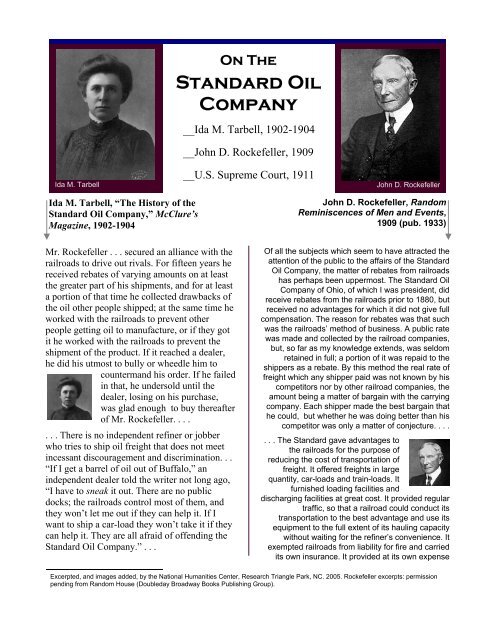

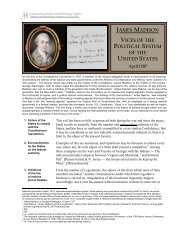
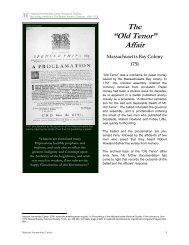
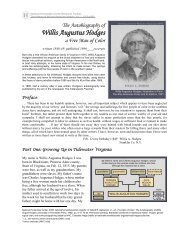
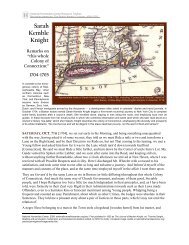
![The Requerimiento [Requirement], Council of Castile, 1510 ...](https://img.yumpu.com/21979685/1/190x245/the-requerimiento-requirement-council-of-castile-1510-.jpg?quality=85)
